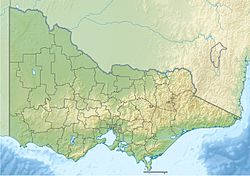Hepburn Lagoon facts for kids
Quick facts for kids Hepburn's Lagoon |
|
|---|---|
| Location | Smeaton, Victoria |
| Coordinates | 37°21′58″S 144°00′47″E / 37.366218°S 144.0130994°E |
| Type | Artificial |
| Primary inflows | Langdon's Creek |
| Primary outflows | Birch Creek outlet; evaporation |
| Basin countries | Australia |
| Max. length | 1.3 km (0.81 mi) |
| Max. width | 1 km (0.62 mi) |
| Water volume | 3,000 ML (660,000,000 imp gal; 790,000,000 US gal) |
| Settlements | Smeaton |
Hepburn Lagoon is a large, human-made lake located in Victoria, Australia. You can find it between the towns of Kingston and Blampied.
This lagoon sits on a flat area made of volcanic rock. It was once a swamp in a natural dip in the land, created by ancient volcanoes. Sometimes, people also call it Anderson's Lagoon. Langdon's Creek feeds water into the lake. The lagoon's water then flows into Birch Creek and helps power the water race for Anderson's Mill, Smeaton. It's a popular spot for fishing, and you can find fish like trout, redfin, and tench there.
History of Hepburn Lagoon
The first dam at Hepburn Lagoon was built before 1864. Its main job was to provide water for a nearby flour mill. However, in 1870, huge floods caused the dam to break. This event damaged a lot of land around the area.
Because of the damage, a new dam was built in 1871-1872. This new dam was designed to improve the water supply for the town of Clunes. The dam was made even bigger in 1960. Today, it can hold up to 3,000 megalitres (which is 3 billion litres!) of water. The lagoon's water is used for watering crops (irrigation) and providing water for homes and farm animals. This is managed by controlling the flow of Langdon's Creek.


